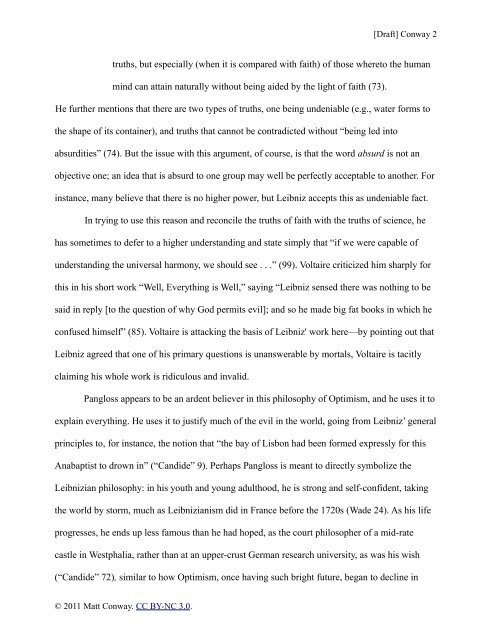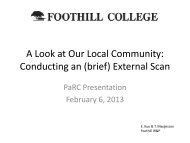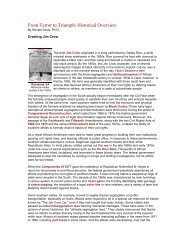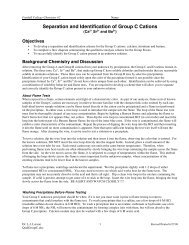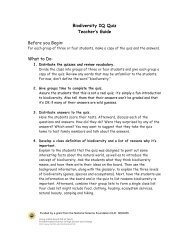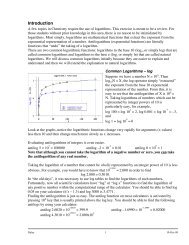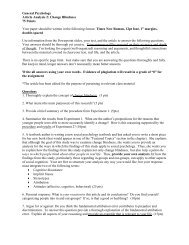Matt Conway Prof. Isabel Sperry ENGL 1B 17 Jun. 2011 Candide ...
Matt Conway Prof. Isabel Sperry ENGL 1B 17 Jun. 2011 Candide ...
Matt Conway Prof. Isabel Sperry ENGL 1B 17 Jun. 2011 Candide ...
You also want an ePaper? Increase the reach of your titles
YUMPU automatically turns print PDFs into web optimized ePapers that Google loves.
[Draft] <strong>Conway</strong> 2<br />
truths, but especially (when it is compared with faith) of those whereto the human<br />
mind can attain naturally without being aided by the light of faith (73).<br />
He further mentions that there are two types of truths, one being undeniable (e.g., water forms to<br />
the shape of its container), and truths that cannot be contradicted without “being led into<br />
absurdities” (74). But the issue with this argument, of course, is that the word absurd is not an<br />
objective one; an idea that is absurd to one group may well be perfectly acceptable to another. For<br />
instance, many believe that there is no higher power, but Leibniz accepts this as undeniable fact.<br />
In trying to use this reason and reconcile the truths of faith with the truths of science, he<br />
has sometimes to defer to a higher understanding and state simply that “if we were capable of<br />
understanding the universal harmony, we should see . . .” (99). Voltaire criticized him sharply for<br />
this in his short work “Well, Everything is Well,” saying “Leibniz sensed there was nothing to be<br />
said in reply [to the question of why God permits evil]; and so he made big fat books in which he<br />
confused himself” (85). Voltaire is attacking the basis of Leibniz' work here—by pointing out that<br />
Leibniz agreed that one of his primary questions is unanswerable by mortals, Voltaire is tacitly<br />
claiming his whole work is ridiculous and invalid.<br />
Pangloss appears to be an ardent believer in this philosophy of Optimism, and he uses it to<br />
explain everything. He uses it to justify much of the evil in the world, going from Leibniz’ general<br />
principles to, for instance, the notion that “the bay of Lisbon had been formed expressly for this<br />
Anabaptist to drown in” (“<strong>Candide</strong>” 9). Perhaps Pangloss is meant to directly symbolize the<br />
Leibnizian philosophy: in his youth and young adulthood, he is strong and self-confident, taking<br />
the world by storm, much as Leibnizianism did in France before the <strong>17</strong>20s (Wade 24). As his life<br />
progresses, he ends up less famous than he had hoped, as the court philosopher of a mid-rate<br />
castle in Westphalia, rather than at an upper-crust German research university, as was his wish<br />
(“<strong>Candide</strong>” 72), similar to how Optimism, once having such bright future, began to decline in<br />
© <strong>2011</strong> <strong>Matt</strong> <strong>Conway</strong>. CC BY-NC 3.0.


